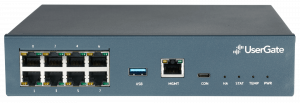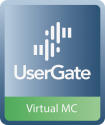Open and uncontrolled access to the Internet in public places runs counter to different countries' legislation rules. Furthermore, in some cases public access point administrators are responsible for instituting filtering that protects users against visiting dangerous, questionable, or prohibited resources.
The basic capabilities of any standard Wi-Fi access point, such as the ability to establish blacklists or more advanced Internet filtering services, do not ensure the implementation of legal requirements since they do not analyze downloaded content and are not able to detect and block prohibited materials based on a webpage's contents. This problem can be resolved by using a dedicated server for filtering that is installed and configured for an individual Wi-Fi access point or a group of them.
UserGate performs morphological analysis on webpages to search for specific words and phrases. Our solution uses specialized morphological dictionaries that have been compiled based on legal requirements related to obscene language, pornography, suicide, drugs, and terrorism. UserGate allows for the authentication of public Wi-Fi users via password, text message, or other methods. UserGate is widely used to tackle problems on not only public Wi-Fi networks, but also the networks of telecommunications providers and thousands of educational institutions. Because our filtering tools have been applied in such a wide range of fields, they are proven to adapt to the current standards of many countries legislation and the distinctive features of non-English Internet societies for some most spoken languages.









